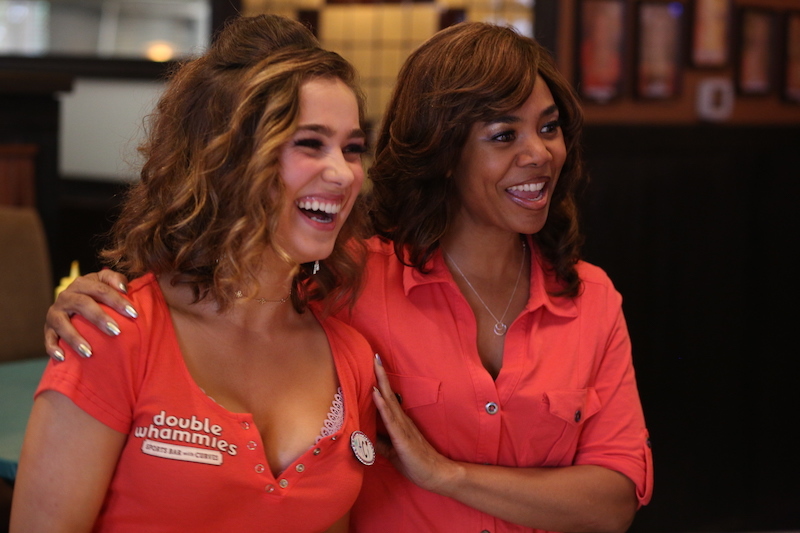
Back in the late 70s and early 80s, there were lots of films about downtrodden, but strong, working class women going up against a patriarchal or oppressive system (think Sally Field in Norma Rae or Meryl Streep in Silkwood). That sort of film died off for whatever reason—Erin Brockovich was probably the most recent iteration—but we now have Regina Hall in Support the Girls, reviving the genre and giving a knockout performance in the process.
She plays Lisa, the day manager of a privately-owned Hooters-type sports bar called Double Whammies, where the waitresses wear half-shirts and are encouraged to touch, but never squeeze the male customers (“we’re a family restaurant”). When we first meet her, she’s crying in her car—shades of Holly Hunter in Broadcast News—and steeling herself for another challenging day. The entire film takes place over course of this day and it manages to feel at once extremely typical—Lisa has to dodge crisis after crisis, handle unruly customers, and both mentor and discipline her beloved “girls”—and kind of momentous, too. In a way, Lisa’s life has been leading to this day, but Andrew Bujalski’s film just drops us in the middle and lets us catch up.
So here are just a few of the fires Lisa has to put out as she goes about her job: One of the girls gets a rogue tattoo on her midsection and has to be fired (tattoos are verboten). The bar’s cable goes out (in a downright triggering bit of art imitating life, Lisa gets call waiting and is disconnected by the cable company when she answers it). A man—undoubtedly tied to an employee—has tried to break into the restaurant’s safe and gotten stuck in the crawl space. A somewhat scary looking biker dude calls one of her girls “fat” and has to be kicked out, and so on.
There are two other, even more pressing concerns: A new, chain restaurant—the similarly branded ManCave—is opening up down the street, threatening to steal Double Whammies’ customers. And Lisa has decided to host an off-the-books car wash fundraiser for one of her girls who is facing legal fees after running over her no-good boyfriend and breaking his leg (it tells you all you need to know about Lisa that not only is she raising money for this employee, she’s also currently letting her crash at her place).
The details of Lisa’s personal life—basically marital problems with an unemployed, possibly depressed husband—are thinly drawn out to the point of being confusing (I wasn’t totally sure why she and her husband were apartment hunting—possibly for him after a separation?). And they’re unnecessary, too. Lisa is essentially married to her job and it’s her staffers—mostly young, broke, under-educated girls in their early 20s who make terrible romantic and financial choices—who are her real family. She loves them all, but has two rocks: The touchingly good-natured Maci (Haley Lu Richardson) and the single mother Danyelle (Shayna McHayle). It’s Danyelle—who is black like Lisa—who notes that the restaurant’s “no more than two women of color per shift” policy is racist and totally messed up. Lisa secretly agrees, but she’s just trying to keep her head down and get her job done. That is the beauty of Hall’s performance: It’s not histrionic or showy. She honors the quiet competence, decency, and survival skills of women like Lisa with nuance and grace.
Support the Girls is most definitely a comedy—it has many rollicking, laugh-out-loud moments—but it shares the beating heart of a proletariat drama. Not all of the film works—besides Lisa’s undercooked personal life, it meanders a bit and some of the pacing seems off—but it does a splendid job of depicting a truly lived in world with characters we believe in and care about. And Hall anchors it all, giving a performance that more than earns its place in the Working Class Heroine Hall of Fame.
Support the Girls opens this Friday at the Parkway Theatre.
